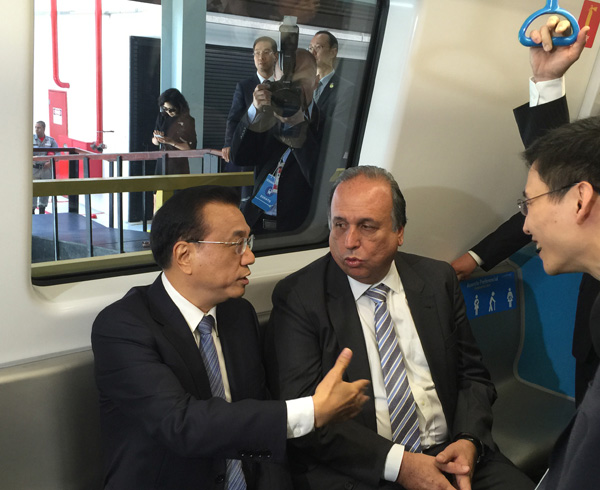Premier Li Keqiang takes a ride on the new subway Line 4 with Rio de Janeiro Governor Luiz Fernando de Souza on Wednesday. The train was made by China's CNR Corp. [Provided to China Daily]

Super salesman inspects Chinese-built subway train that will carry sports fans to Rio Olympics
Premier Li Keqiang, regarded as a super salesman for the country's railway industry, took a ride on a new train on Wednesday that was purchased from China by Rio de Janeiro's Metro system.
Li, who is on a four-nation tour of Latin America, had earlier announced plans for a $30 billion fund to support efforts to increase the industrial production capacity of countries in the region.
The new Metro Line 4 is the latest example of China's efforts to export its industrial production capacity. It is due to start operations in June next year, in time for the Olympic Games,
The six-car train departed slowly from a station on a test line with the premier on board, and it traveled 350 meters before heading back. The train, made by China CNR Corp, was handed over to the local government in February.
Carlos Roberto Osorio, Rio's transportation secretary, said Line 4 is 16 kilometers long and is the largest urban infrastructure investment project in Brazil.
"We will import another 15 new trains for the subway from China before March 2016," he said.
"We have a very serious challenge in urban mobility in Rio and the answer to that challenge is investment in infrastructure, particularly in the subways."
He said the city chose Chinese trains because the country offers the best price and the best quality.
Li proposed the industrial fund while attending the China-Brazil Business Summit on Tuesday along with Brazilian President Dilma Rousseff in the capital, Brasilia.
The initiative will provide financing to support bilateral cooperative projects involving production capacity and the manufacture of equipment.
Three financing channels — funds, loans and insurance — should be expanded to assist joint projects, Li said.
China is willing to expand cooperation with Latin American countries in areas such as currency swaps and settlement to "jointly champion the stability of regional and world financial markets", Li said.
Rousseff said China's financial support for infrastructure will "become another milestone" for the economic development of her country and bilateral cooperation. "Brazil welcomes the engagement by Chinese enterprises in projects regarding fields such as power and railways," she added.
Chen Duqing, a former Chinese ambassador to Brazil and now a senior research fellow at the Chinese Academy of Social Sciences, said cooperation over industrial capacity is one of the pathways that will help China and Latin America to survive the restructuring of the global production chain.
"The construction of railways, ports and expressways is among China's industrial strengths", and such cooperation "will make a difference in helping Latin American economies", Chen said.
Li said the countries are set to shape three sectors — logistics, power and information — that span the South American continent by involving enterprises from both sides.
The continent will see a logistics pathway mainly supported by railways, and a power pathway will be built to link all the Latin American countries with highly efficient electricity grids.
Contact the writers at [email protected] and [email protected]